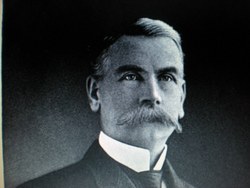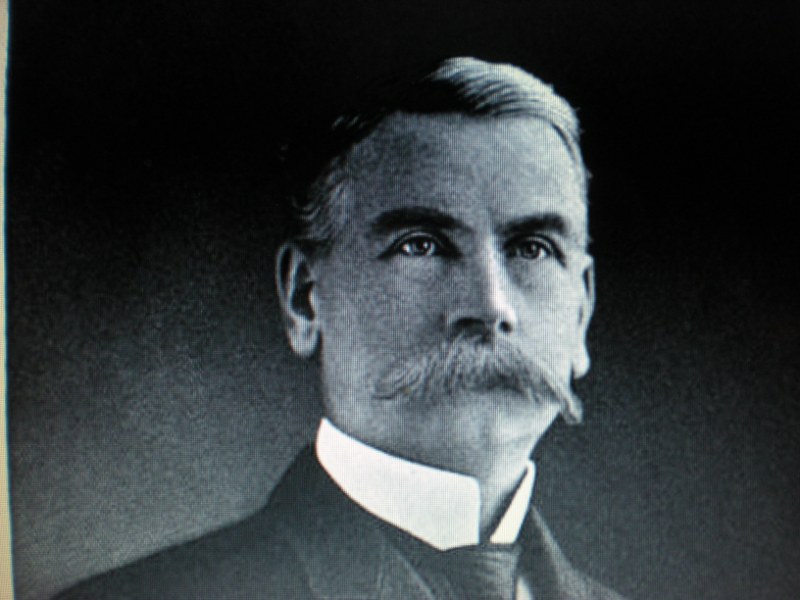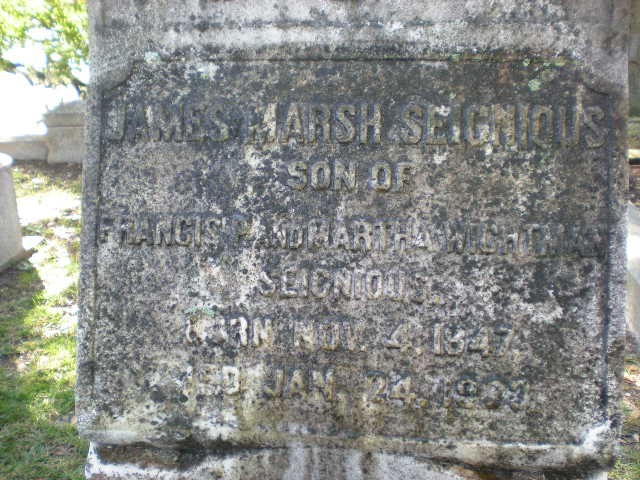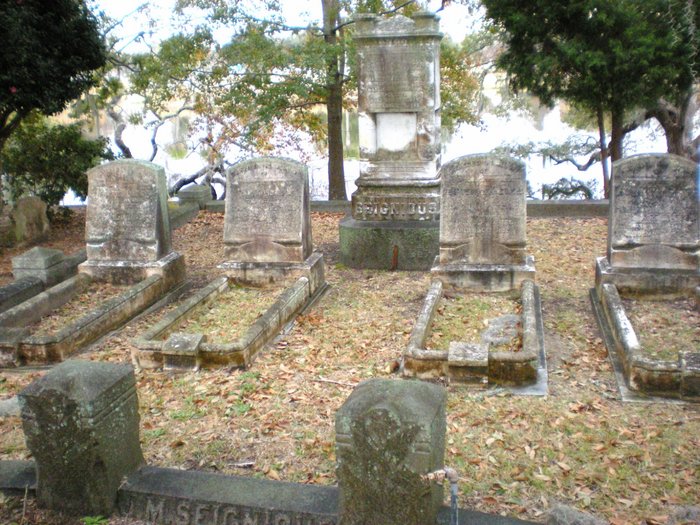"Mr. Seignious has been twice married. First, November 19, 1868, to Christiana H. Pelzer, daughter of Francis J. Pelzer, of Charleston, South Carolina. She died in 1889, after having borne nine children, four of whom — Eva Antoinette, wife of Vanderhorst B. Murray; Mattie, wife of Joseph L. Barry; and one daughter and one son unmarried — are now (1907) living. His second marriage was to Esther Barnwell Heyward, daughter of Honorable Nathaniel B. Heyward, of Beaufort, South Carolina, to whom he was married in 1891."
"Cotton factor, banker, financier and expert accountant, was born in the city of Charleston, South Carolina, November 4, 1847, son of Francis P. and Martha Hester (Wightman) Seignious. He is of French lineage on his father's side and English and Scotch on his mother's side.
His paternal grandfather was born in Alsace, France, and during the Revolution of 1789, in the reign of Louis XIV, with other Huguenots, he fled from his native country and took refuge on the Island of Martinique, near Hayti. Shortly after his arrival in Hayti the historical negro insurrection in San Domingo took place, in which he was wounded. Subsequently, he took passage, with other refugees, in an American vessel bound for the American coast, suffered shipwreck shortly thereafter, and was finally rescued by a passing vessel and landed in Charleston, South Carolina. Here he lived, married, and died, both he and his wife having been interred in Trinity church cemetery, Charleston.
His materal grandmother (mother of Martha Hester Wightman), Eliza Stoll, was born in Charleston, January 25, 1800, and died in the same city, August 18, 1834. She was a daughter of Elizabeth (Douglas) Stoll, who came from England in the seventeenth century, and was of English and Scotch parentage. Her father, Justinus Stoll, was a man of large wealth, and owned a large part of the South Battery, of Charleston, in his lifetime, a relic of which is Stoll's alley, which bears his names at the present time. His wife was a noble and remarkable woman, the history of whose life reads like a romance.
John Thomas Wightman, Sr., Mr. Seignious' paternal grandfather, was born in Charleston, South Carolina, March 25, 1784, and there died August 28, 1875. He was a son of Major William Wightman, who was a major of a regiment in the American Revolutionary army, and a son of William Wightman, of Harrow-on-the-Hill, County of Middlesex (near London), England, who was consul at Tunis, Algeria, under the British crown, about the year 1735.
Major Wightman owned considerable property at the corner of Chalmers and Meeting streets in Charleston. He resided in a large brick house just north of his place of business, both of which buildings are still (1907) standing in their original places. He is described as a portly and handsome man, of quiet demeanor and moral repute. His wife was a daughter of an old Charleston family, whose mother, during the battle of Fort Moultrie, when the troops were drawn up along the battery, passed along the line encouraging the soldiers and fresh recruits in their struggle against the British.
The Wightmans are from a very old family stock, both in this country and England. It is thought that they originally came from the Isle of Wight. Books of heraldry give three families-English, Scotch and Welsh-but the Charleston branch comes direct from the English, and was one of three branches to be established in this country. Of the other two, one settled in New England, and one in New Jersey. The New England Wightmans were loyal to the British crown, fought in the American Revolution, and Captain John Wightman was wounded at the battle of Hobkirk's Hill, South Carolina. He was a son of Colonel John Wightman, of the "Loyal New Englanders" who returned to England at the close of the war, where he died.
The coat-of-arms and crest of the Wightman family were granted to William Wightman, Esquire, of Harrow-on-the-Hill, Middlesex county, England, in London, on July 14, 1562. The crest of the family was still retained and used on the family coach by Mr. Seignious's great-grandfather, during his lifetime, in Charleston. Mr. Seignious has in his possession a copy of the coat-of-arms and crest.
Four of the Wightman brothers left the old home in England, namely, John, Thomas, William, and Nicholas. The two former were the founders of the Northern branch of the family in America, and William of the Southern branch. Nicholas was murdered in Charleston, South Carolina, about 1788. A full account of this event is inscribed on this tombstone in the old St. Philip's church graveyard in Charleston, South Carolina.
Major William Wightman, and Elizabeth, his wife, had two sons, whose names were William and John Thomas,named respectively, after their uncles, both born in Charleston. William was the head of the Bishop William M. Wightman branch of the family, which had numerous descendants.
John Thomas, the other son, founder of the Charleton branch, and who, as before stated, married Eliza Stoll, had the following named children: Martha Hester, born 1819, died 1905; William Edward, born 1821, died in California 1870, unmarried; Reverend John Thomas Wightman, D. D. born in 1825, married and now (1907) living in Baltimore, Maryland; Harriet Elizabeth, born in 1830, widow, residing with her son in the West; Ann Eliza, born 1832, married, and died a few years ago; and Charles Christopher, born in 1834, married, died 1905.
The Southern branch of the Wightman family has been remarkable for the number of wives of ministers that it has supplied to the different churches. They were a highly educated and intelligent family, of high moral character, and held high positions in the domain of military, literary, and civic affairs.
The early life of James Marsh Seignious was, for the most past, passed in the city of Charleston. The influence of his mother was particularly strong on his moral an spiritual life, and his father's personality impressed upon him the more rugged virtues. His father was a manufacturer and merchant, who confined himself closely to his business interests. He was a man of firm and sincere friendships, conservative in his opinions, fearless in the discharge of duty, prompt in meeting every obligation or promise made, industrious, persevering, quick in action, genial in manner and of a pleasant and jovial temperament.
There were eight children in the family, four of whom are now (1907) living. James M. was the fourth child. He was of robust constitution, fond of outdoor sports, studious of habit, ambitious to succeed, and was particularly fond of mathematics, debate and oratory. He attended the public schools of the city, later studied under private tutors, and in 1863 entered the first class of the Charleston high school, from which he was graduated in his seventeenth year, with high honors, and delivered the class anniversary address.
Immediately after his graduation he entered the Confederate army, and remained therein until the close of the war. Upon his return home he found that his father had suffered the loss of all his property, except his home and place of business, and was without means to conduct his former enterprises. The son, thus placed upon his own resources, accepted a position, at a small salary, in the office of the Charleston "Daily News." Later he was promoted assistant bookkeeper, and became cashier and general office manager, at a good salary, before he had reached his majority.
In 1868 he was a tutor in what is now Porter Military academy, intending to study during leisure hours, but in the following year he entered the bookkeeping department of the First National bank, of Charleston, and continued there until 1870, when he formed a co-partnership with J.B.E. Sloan as a cotton factor. In 1881 he established an independent business of his own in the same line, which has been so successful that at the present time (1907) he is ranked among the leading cotton factors and commission merchants of the state.
Mr. Seignious, in addition to his cotton interests, is a member of the board of directors of the Bank of Charleston, National Banking association, and chairman of the examining committee of said association; director of the Bank of Orangeburg, South Carolina, since its organization in 1887; and for many years was director of the Bank of Edgefield, South Carolina; and vice-president of the Royal Bag and Yarn Manufacturing company, of Charleston, South Carolina, to which latter position he declined reelection in recent years; President of the Charleston Cotton exchange for seven years, and president now; member of the board of harbor commissioners; member of the dock commission for Charleston; was made manager of the wayrs and means department of the South Carolina Interstate and West Indian exposition, during 1901-1902, by unanimous request and vote of the directors; is a member of the Charleston chamber of commerce; the Young Men's Business league; Commercial club, and many leading societies, and has represented the city of Charleston in many business convention in other cities.
Politically, Mr. Seignious is an unswerving Democrat. He has been a delegate to the county and state Democratic conventions, representing the county of Charleston, in nearly all the conventions held during the past twenty years. In 1902 he was appointed to the Danish vice-consulship for South Carolina by the foreign ministry of Denmark, and confirmed by the president of the United States."
"Mr. Seignious has been twice married. First, November 19, 1868, to Christiana H. Pelzer, daughter of Francis J. Pelzer, of Charleston, South Carolina. She died in 1889, after having borne nine children, four of whom — Eva Antoinette, wife of Vanderhorst B. Murray; Mattie, wife of Joseph L. Barry; and one daughter and one son unmarried — are now (1907) living. His second marriage was to Esther Barnwell Heyward, daughter of Honorable Nathaniel B. Heyward, of Beaufort, South Carolina, to whom he was married in 1891."
"Cotton factor, banker, financier and expert accountant, was born in the city of Charleston, South Carolina, November 4, 1847, son of Francis P. and Martha Hester (Wightman) Seignious. He is of French lineage on his father's side and English and Scotch on his mother's side.
His paternal grandfather was born in Alsace, France, and during the Revolution of 1789, in the reign of Louis XIV, with other Huguenots, he fled from his native country and took refuge on the Island of Martinique, near Hayti. Shortly after his arrival in Hayti the historical negro insurrection in San Domingo took place, in which he was wounded. Subsequently, he took passage, with other refugees, in an American vessel bound for the American coast, suffered shipwreck shortly thereafter, and was finally rescued by a passing vessel and landed in Charleston, South Carolina. Here he lived, married, and died, both he and his wife having been interred in Trinity church cemetery, Charleston.
His materal grandmother (mother of Martha Hester Wightman), Eliza Stoll, was born in Charleston, January 25, 1800, and died in the same city, August 18, 1834. She was a daughter of Elizabeth (Douglas) Stoll, who came from England in the seventeenth century, and was of English and Scotch parentage. Her father, Justinus Stoll, was a man of large wealth, and owned a large part of the South Battery, of Charleston, in his lifetime, a relic of which is Stoll's alley, which bears his names at the present time. His wife was a noble and remarkable woman, the history of whose life reads like a romance.
John Thomas Wightman, Sr., Mr. Seignious' paternal grandfather, was born in Charleston, South Carolina, March 25, 1784, and there died August 28, 1875. He was a son of Major William Wightman, who was a major of a regiment in the American Revolutionary army, and a son of William Wightman, of Harrow-on-the-Hill, County of Middlesex (near London), England, who was consul at Tunis, Algeria, under the British crown, about the year 1735.
Major Wightman owned considerable property at the corner of Chalmers and Meeting streets in Charleston. He resided in a large brick house just north of his place of business, both of which buildings are still (1907) standing in their original places. He is described as a portly and handsome man, of quiet demeanor and moral repute. His wife was a daughter of an old Charleston family, whose mother, during the battle of Fort Moultrie, when the troops were drawn up along the battery, passed along the line encouraging the soldiers and fresh recruits in their struggle against the British.
The Wightmans are from a very old family stock, both in this country and England. It is thought that they originally came from the Isle of Wight. Books of heraldry give three families-English, Scotch and Welsh-but the Charleston branch comes direct from the English, and was one of three branches to be established in this country. Of the other two, one settled in New England, and one in New Jersey. The New England Wightmans were loyal to the British crown, fought in the American Revolution, and Captain John Wightman was wounded at the battle of Hobkirk's Hill, South Carolina. He was a son of Colonel John Wightman, of the "Loyal New Englanders" who returned to England at the close of the war, where he died.
The coat-of-arms and crest of the Wightman family were granted to William Wightman, Esquire, of Harrow-on-the-Hill, Middlesex county, England, in London, on July 14, 1562. The crest of the family was still retained and used on the family coach by Mr. Seignious's great-grandfather, during his lifetime, in Charleston. Mr. Seignious has in his possession a copy of the coat-of-arms and crest.
Four of the Wightman brothers left the old home in England, namely, John, Thomas, William, and Nicholas. The two former were the founders of the Northern branch of the family in America, and William of the Southern branch. Nicholas was murdered in Charleston, South Carolina, about 1788. A full account of this event is inscribed on this tombstone in the old St. Philip's church graveyard in Charleston, South Carolina.
Major William Wightman, and Elizabeth, his wife, had two sons, whose names were William and John Thomas,named respectively, after their uncles, both born in Charleston. William was the head of the Bishop William M. Wightman branch of the family, which had numerous descendants.
John Thomas, the other son, founder of the Charleton branch, and who, as before stated, married Eliza Stoll, had the following named children: Martha Hester, born 1819, died 1905; William Edward, born 1821, died in California 1870, unmarried; Reverend John Thomas Wightman, D. D. born in 1825, married and now (1907) living in Baltimore, Maryland; Harriet Elizabeth, born in 1830, widow, residing with her son in the West; Ann Eliza, born 1832, married, and died a few years ago; and Charles Christopher, born in 1834, married, died 1905.
The Southern branch of the Wightman family has been remarkable for the number of wives of ministers that it has supplied to the different churches. They were a highly educated and intelligent family, of high moral character, and held high positions in the domain of military, literary, and civic affairs.
The early life of James Marsh Seignious was, for the most past, passed in the city of Charleston. The influence of his mother was particularly strong on his moral an spiritual life, and his father's personality impressed upon him the more rugged virtues. His father was a manufacturer and merchant, who confined himself closely to his business interests. He was a man of firm and sincere friendships, conservative in his opinions, fearless in the discharge of duty, prompt in meeting every obligation or promise made, industrious, persevering, quick in action, genial in manner and of a pleasant and jovial temperament.
There were eight children in the family, four of whom are now (1907) living. James M. was the fourth child. He was of robust constitution, fond of outdoor sports, studious of habit, ambitious to succeed, and was particularly fond of mathematics, debate and oratory. He attended the public schools of the city, later studied under private tutors, and in 1863 entered the first class of the Charleston high school, from which he was graduated in his seventeenth year, with high honors, and delivered the class anniversary address.
Immediately after his graduation he entered the Confederate army, and remained therein until the close of the war. Upon his return home he found that his father had suffered the loss of all his property, except his home and place of business, and was without means to conduct his former enterprises. The son, thus placed upon his own resources, accepted a position, at a small salary, in the office of the Charleston "Daily News." Later he was promoted assistant bookkeeper, and became cashier and general office manager, at a good salary, before he had reached his majority.
In 1868 he was a tutor in what is now Porter Military academy, intending to study during leisure hours, but in the following year he entered the bookkeeping department of the First National bank, of Charleston, and continued there until 1870, when he formed a co-partnership with J.B.E. Sloan as a cotton factor. In 1881 he established an independent business of his own in the same line, which has been so successful that at the present time (1907) he is ranked among the leading cotton factors and commission merchants of the state.
Mr. Seignious, in addition to his cotton interests, is a member of the board of directors of the Bank of Charleston, National Banking association, and chairman of the examining committee of said association; director of the Bank of Orangeburg, South Carolina, since its organization in 1887; and for many years was director of the Bank of Edgefield, South Carolina; and vice-president of the Royal Bag and Yarn Manufacturing company, of Charleston, South Carolina, to which latter position he declined reelection in recent years; President of the Charleston Cotton exchange for seven years, and president now; member of the board of harbor commissioners; member of the dock commission for Charleston; was made manager of the wayrs and means department of the South Carolina Interstate and West Indian exposition, during 1901-1902, by unanimous request and vote of the directors; is a member of the Charleston chamber of commerce; the Young Men's Business league; Commercial club, and many leading societies, and has represented the city of Charleston in many business convention in other cities.
Politically, Mr. Seignious is an unswerving Democrat. He has been a delegate to the county and state Democratic conventions, representing the county of Charleston, in nearly all the conventions held during the past twenty years. In 1902 he was appointed to the Danish vice-consulship for South Carolina by the foreign ministry of Denmark, and confirmed by the president of the United States."
Family Members
Sponsored by Ancestry
Advertisement
Records on Ancestry
Advertisement
























